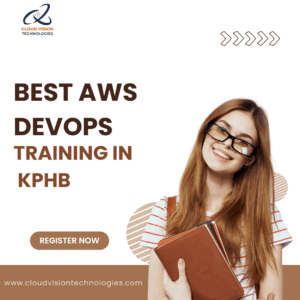Introduction to AWS DevOps
AWS DevOps Training in KPHB, In today’s competitive and fast-evolving software development landscape, organizations are under constant pressure to deliver high-quality applications faster, more securely, and with greater efficiency. Traditional software development models often suffer from bottlenecks between development and operations teams, resulting in delays, errors, and costly rework. That’s where DevOps comes into play: a culture and set of practices designed to unify development (Dev) and operations (Ops), fostering collaboration, automation, and continuous improvement. Cloud Vision Technologies.
DevOps emphasizes automation, integration, and communication across all stages of the software lifecycle from development and testing to deployment and monitoring. When combined with the scalability and flexibility of the cloud, DevOps practices become even more powerful. AWS (Amazon Web Services) offers a rich ecosystem of tools and services that empower teams to implement DevOps at scale, ensuring faster delivery cycles, consistent environments, and minimal downtime. AWS DevOps Training in KPHB.

What is AWS DevOps?
AWS DevOps refers to the use of Amazon Web Services to adopt and implement DevOps methodologies effectively. It combines the principles of DevOps with a comprehensive set of cloud-based tools provided by AWS to support automation, continuous integration and delivery (CI/CD), infrastructure as code (IaC), configuration management, monitoring, and security. AWS DevOps Training in KPHB
With AWS DevOps, teams can automate repetitive tasks, deploy applications in a consistent and reliable manner, and monitor their systems in real time. AWS services like CodePipeline, CodeBuild, CodeDeploy, and CloudFormation allow developers to manage every part of the application lifecycle seamlessly. Meanwhile, monitoring and observability tools like CloudWatch and CloudTrail provide valuable insights into performance and system behavior.
By adopting AWS DevOps, organizations gain the ability to release features faster, recover from failures more quickly, scale applications effortlessly, and ensure compliance and security all while reducing manual overhead. Whether you’re a startup building your first product or an enterprise managing complex architectures, AWS DevOps provides the flexibility and tools needed to accelerate innovation and deliver value continuously.
Core AWS DevOps Services
AWS provides a wide range of services tailored for DevOps workflows. These services help automate and streamline every stage of software development and delivery from source code management to infrastructure provisioning and performance monitoring. AWS DevOps Training in KPHB.
AWS CodePipeline
AWS CodePipeline is a fully managed continuous integration and continuous delivery (CI/CD) service. It automates the steps required to release software updates quickly and reliably. With CodePipeline, every time you make changes to your code, it automatically builds, tests, and deploys the application based on the defined workflow. It integrates seamlessly with tools like GitHub, AWS CodeCommit, Jenkins, and more, enabling developers to build efficient CI/CD pipelines with minimal manual intervention.
AWS CodeBuild
AWS CodeBuild is a fully managed build service that compiles your source code, runs unit tests, and produces ready-to-deploy software packages. It eliminates the need to provision and manage your own build servers, making the build process highly scalable and cost-effective. CodeBuild is designed to scale continuously and handle multiple builds simultaneously, ensuring faster delivery of software updates even in large development teams. AWS DevOps Training in KPHB.
AWS CodeDeploy
AWS CodeDeploy automates application deployments to Amazon EC2 instances, AWS Lambda functions, and even on-premises servers. It supports advanced deployment strategies such as rolling updates and blue/green deployments, reducing the risk of downtime and allowing seamless rollback if issues are detected. This service ensures that your updates are delivered safely and consistently, regardless of the deployment target.
AWS CodeCommit
AWS CodeCommit is a secure, scalable, and managed source control service that hosts private Git repositories. It helps teams collaborate efficiently by storing code and tracking changes in a centralized repository. CodeCommit integrates effortlessly with AWS’s CI/CD tools, enabling an end-to-end DevOps pipeline directly within the AWS ecosystem. It also supports standard Git commands, so developers can use their preferred Git-based tools.
AWS CloudFormation
AWS CloudFormation is an Infrastructure as Code (IaC) tool that allows you to define and provision AWS infrastructure using code. Using JSON or YAML templates, you can describe the resources and configurations needed for your application. CloudFormation simplifies the management of infrastructure by making it repeatable, version-controlled, and consistent across environments, reducing manual errors and increasing productivity. AWS DevOps Training in KPHB.
Amazon EC2 & ECS
Amazon EC2 (Elastic Compute Cloud) provides scalable virtual servers that you can configure based on your application needs. EC2 is commonly used for hosting applications, running back-end services, and deploying microservices. On the other hand, Amazon ECS (Elastic Container Service) is a container orchestration service that helps run and manage Docker containers. Together, EC2 and ECS form the foundation of many cloud-based deployments, offering flexibility and control over compute resources. AWS DevOps Training in KPHB.
AWS CloudWatch
AWS CloudWatch is a monitoring and observability service that provides data and actionable insights for AWS resources and applications. It collects and tracks metrics, logs, and events, allowing developers and system administrators to set alarms, visualize performance, and troubleshoot operational issues. CloudWatch helps ensure the health and performance of applications, making it an essential part of any DevOps toolchain. AWS DevOps Training in KPHB.
AWS Lambda
AWS Lambda is a serverless computing service that lets you run code without provisioning or managing servers. You simply upload your code, and Lambda automatically handles everything required to run and scale it. It is ideal for event-driven applications, such as responding to HTTP requests, changes in data, or cloud events. Lambda integrates well with other AWS services, enabling serverless DevOps pipelines that are cost-effective and highly scalable. AWS DevOps Training in KPHB.

Benefits of Using AWS for DevOps
Implementing DevOps practices using AWS offers numerous advantages that help organizations improve software delivery speed, enhance application reliability, and reduce operational costs. Here are some key benefits:
Scalability
One of the major strengths of AWS is its ability to scale applications effortlessly. Whether you’re running a small application with a few users or a large-scale platform with millions of requests, AWS provides the infrastructure to automatically scale up or down based on demand. Services like Auto Scaling and Elastic Load Balancing help maintain consistent application performance without manual intervention. This dynamic scalability is particularly useful in DevOps environments where application loads may vary frequently.
Automation
AWS offers a robust suite of DevOps tools that allow you to automate the entire software development lifecycle. Services like CodePipeline, CodeBuild, and CodeDeploy enable continuous integration and continuous delivery (CI/CD), eliminating the need for manual steps in building, testing, and deploying code. With automation, teams can release features faster and more frequently, reduce human errors, and maintain high-quality standards throughout the release process. AWS DevOps Training in KPHB.
Reliability
AWS provides high reliability through tools designed for monitoring and logging. Services such as Amazon CloudWatch and AWS CloudTrail offer deep visibility into application and infrastructure performance. CloudWatch enables you to track metrics, create dashboards, and set alarms for system health, while CloudTrail records API activity across your AWS account, helping with auditing and troubleshooting. These tools ensure that your applications are always monitored and resilient, reducing downtime and performance issues.
Security
Security is a top priority for any DevOps pipeline, and AWS offers comprehensive features to protect your applications and data. AWS Identity and Access Management (IAM) allows you to define fine-grained permissions, ensuring that only authorized users and services can access specific resources. Additionally, AWS provides data encryption at rest and in transit, multi-factor authentication (MFA), and network isolation features like Virtual Private Clouds (VPCs). These security capabilities make it easier to build secure and compliant DevOps workflows. AWS DevOps Training in KPHB.
Cost-Effective
With AWS, you only pay for the resources you use, thanks to its flexible pay-as-you-go pricing model. This eliminates the need for investing in costly on-premises infrastructure and reduces the overall cost of development and operations. Furthermore, you can optimize costs by using services like AWS Lambda (serverless), EC2 Spot Instances, and S3 lifecycle policies. AWS also offers cost monitoring tools like AWS Budgets and Cost Explorer to help you track usage and manage spending effectively. AWS DevOps Training in KPHB.
Common Use Cases of AWS DevOps
AWS DevOps enables a wide variety of use cases by combining automation, scalability, and powerful development tools. Here are some of the most common scenarios where AWS DevOps is effectively used: AWS DevOps Training in KPHB
Continuous Integration and Delivery (CI/CD) for Web Applications
One of the primary use cases of AWS DevOps is setting up continuous integration and delivery pipelines for modern web applications. Developers push their code to repositories like AWS CodeCommit or GitHub, which then triggers automated workflows using AWS CodePipeline. The code is built, tested, and deployed automatically using AWS CodeBuild and CodeDeploy. This automation accelerates software release cycles, ensures higher code quality, and reduces the risk of manual errors, allowing teams to release new features faster and more reliably. AWS DevOps Training in KPHB.
Infrastructure Automation with AWS CloudFormation and Terraform
Managing infrastructure manually can be time-consuming and error-prone. AWS DevOps embraces the Infrastructure as Code (IaC) approach, where tools like AWS CloudFormation and Terraform are used to define and provision infrastructure using code templates. This enables consistent, repeatable, and version-controlled deployments of servers, databases, networks, and other AWS resources. Developers can replicate entire environments (dev, staging, production) with a single command, saving time and increasing reliability.
Containerized Deployments Using Amazon ECS and Docker
Containerization has become a standard for deploying modern applications due to its portability and efficiency. AWS offers Amazon Elastic Container Service (ECS) and Amazon Elastic Kubernetes Service (EKS) for managing Docker containers at scale. Developers can package applications into containers and deploy them across clusters using ECS, with built-in integration to services like CodePipeline and CloudWatch. This use case is ideal for microservices architectures, where applications are broken down into smaller, independently deployable services. AWS DevOps Training in KPHB.
Serverless DevOps Pipelines Using AWS Lambda and CodePipeline
Serverless computing allows developers to run code without managing servers, and AWS Lambda is at the heart of this model. In a serverless DevOps workflow, AWS Lambda functions are triggered automatically based on events, such as code pushes or database updates. Lambda can be combined with CodePipeline to create highly automated and cost-effective CI/CD workflows. This approach reduces infrastructure overhead, speeds up deployments, and is especially useful for lightweight applications, REST APIs, or event-driven systems. AWS DevOps Training in KPHB.
Best Practices for AWS DevOps
To maximize the effectiveness of your DevOps processes on AWS, it’s essential to follow industry best practices. These practices not only improve efficiency and reliability but also enhance security, scalability, and maintainability of your development workflows.
Use Version Control
Version control is a cornerstone of any successful DevOps strategy. All application code, infrastructure definitions, and deployment scripts should be stored in Git repositories such as AWS CodeCommit, GitHub, or GitLab. This ensures traceability of changes, facilitates team collaboration, and allows easy rollback in case of errors. Using version control also enables integration with CI/CD pipelines, so every code commit can automatically trigger builds and deployments, increasing development speed and confidence. AWS DevOps Training in KPHB.
Automate Everything
Automation is at the heart of DevOps. By automating repetitive and manual tasks like code building, testing, deployment, and infrastructure provisioning you reduce the risk of human errors and improve consistency across environments. Tools like AWS CodePipeline, CodeBuild, and CloudFormation allow you to create fully automated workflows from code commit to production deployment. Automation not only speeds up releases but also makes them more reliable and repeatable. AWS DevOps Training in KPHB.
Monitor Proactively
Monitoring is essential for maintaining application performance and quickly identifying issues in production. AWS offers powerful monitoring tools like Amazon CloudWatch, which can be used to collect and visualize metrics, logs, and events from your applications and infrastructure. Setting up real-time alarms, custom dashboards, and automated responses helps teams stay ahead of problems. Proactive monitoring ensures that you’re not just reacting to incidents but preventing them wherever possible. AWS DevOps Training in KPHB.
With experienced trainers, flexible batch timings, and access to live cloud environments, AWS DevOps training in KPHB can help you gain the practical skills needed to crack interviews and succeed in roles like DevOps Engineer, Cloud Engineer, or Site Reliability Engineer (SRE). Whether you’re a beginner or someone looking to upgrade your skills, KPHB offers a strong learning ecosystem for mastering AWS DevOps.
Secure Your Pipeline
Security should be integrated into every phase of the DevOps lifecycle. On AWS, you can implement Identity and Access Management (IAM) best practices to control who can access your resources and what actions they can perform. Use least privilege principles, multi-factor authentication (MFA), and encrypt sensitive data in transit and at rest. Additionally, tools like AWS Secrets Manager and AWS Systems Manager Parameter Store can be used to securely manage credentials and configuration data used in your CI/CD pipelines.
Use Blue/Green Deployments
A Blue/Green deployment strategy helps minimize downtime and reduce deployment risk by running two identical environments one live (blue) and one idle (green). New application versions are deployed to the green environment and tested before switching traffic over from the blue. If any issue arises, traffic can be routed back to the blue environment, ensuring high availability and safe rollback. AWS services like CodeDeploy and Elastic Load Balancing support Blue/Green deployments, making it easier to adopt this best practice.
AWS DevOps Training in KPHB:
The AWS DevOps training curriculum typically covers essential topics such as CI/CD pipelines, Infrastructure as Code (IaC) using tools like CloudFormation and Terraform, AWS EC2 and Lambda deployments, monitoring with CloudWatch, and automation using CodePipeline, CodeBuild, and CodeDeploy. Many training centers in KPHB also offer real-time projects, case studies, and interview preparation support, making them ideal for job seekers and working professionals alike. AWS DevOps Training in KPHB.
Are you looking to start or advance your career in cloud computing and DevOps? AWS DevOps Training in KPHB (Kukatpally Housing Board, Hyderabad) is the perfect opportunity to gain hands-on skills with one of the most in-demand technology stacks in the IT industry.
KPHB is known as a growing tech and education hub, with many training institutes offering industry-oriented courses. AWS DevOps training here is designed for both fresh graduates and working professionals who want to learn how to automate software delivery and infrastructure management using Amazon Web Services. AWS DevOps Training in KPHB.

Conclusion
In an era where speed, agility, and reliability define successful software delivery, AWS DevOps stands out as a powerful approach to transforming how teams build, test, deploy, and manage applications. By combining the cultural philosophy of DevOps with the robust cloud infrastructure of AWS, organizations can create seamless development workflows that are automated, scalable, and secure. AWS DevOps Training in KPHB.
Adopting AWS DevOps not only accelerates release cycles but also improves collaboration between development and operations teams. It eliminates bottlenecks caused by manual tasks and enables teams to focus on innovation rather than infrastructure maintenance. With services like AWS CodePipeline, CloudFormation, EC2, Lambda, and CloudWatch, businesses can ensure end-to-end automation and monitoring throughout the software development lifecycle. AWS DevOps Training in KPHB.
Whether you’re a startup aiming for rapid MVP deployment or a large enterprise managing complex applications, AWS DevOps offers the flexibility and tools needed to support your growth. It empowers teams to deliver high-quality software with confidence, adapt quickly to changing market demands, and maintain a competitive edge in the digital world. AWS DevOps Training in KPHB
Address: Cloud Vision Technologies
Location: Samhitha Enclave, 3rd floor, KPHB Phase 9, Kukatpally, Hyderabad, Telangana – 500072
Contact Number : +91 8520002606
Mail ID: info@cloudvisiontechnologies.com
Website: https://www.cloudvisiontechnologies.com



